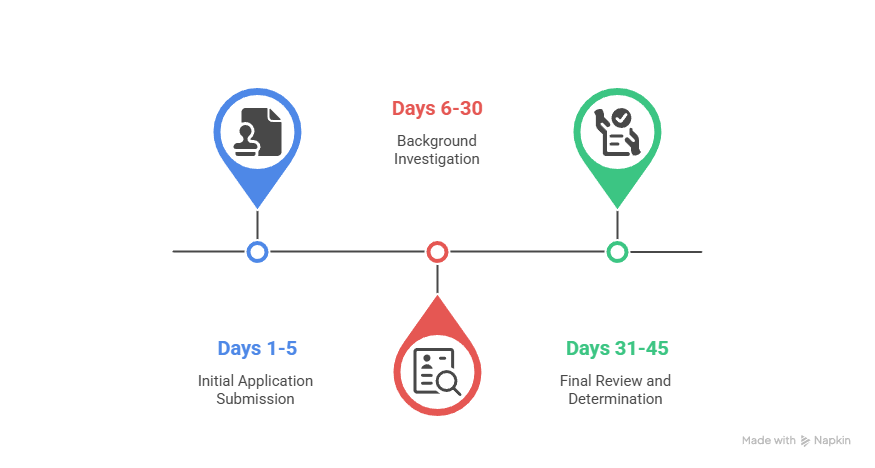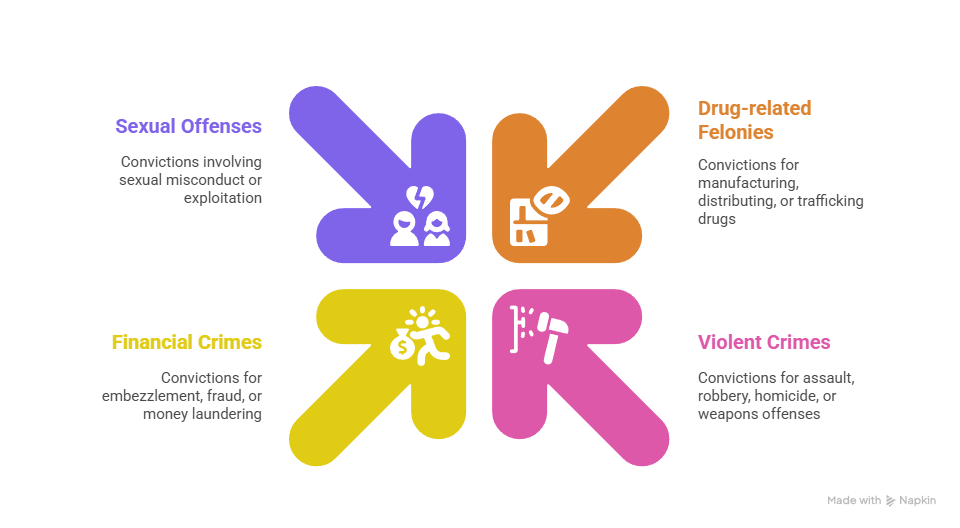Texas cannabis industry background checks require strict compliance with DSHS regulations under the Compassionate Use Act, involving comprehensive criminal history reviews, financial assessments for management positions, and ongoing monitoring requirements that differ significantly from other states' cannabis employment standards. Success in this regulated sector demands thorough preparation and understanding of both disqualifying offenses and appeal processes.
Key Takeaways
- DSHS approval is mandatory for all Texas cannabis industry positions, with no reciprocity accepted from other state cannabis programs or certifications.
- Criminal background checks examine both state and federal databases, with certain felony convictions resulting in permanent disqualification from cannabis employment.
- Financial integrity assessments are required for management and ownership roles, including credit history reviews and debt-to-income evaluations.
- Processing timelines span 45 days across three distinct phases: initial application (days 1-5), background investigation (days 6-30), and final review (days 31-45).
- Ongoing quarterly monitoring is required for all cannabis employees, with employers responsible for maintaining current background check status documentation.
- Appeal processes exist for denied applications, but must be initiated within 30 days of denial notice with comprehensive supporting documentation.
Understanding Texas Cannabis Background Check Requirements
The Texas cannabis industry operates under some of the nation's most stringent background check requirements. These regulations stem from the state's cautious approach to cannabis legalization and prioritize public safety above all else. Understanding these requirements is essential whether you're seeking employment or managing hiring processes in this regulated sector.
Texas cannabis background check systems differ markedly from traditional employment screening. The state maintains a zero-tolerance approach toward certain criminal histories while implementing time-based restrictions for others. This creates a complex landscape where past infractions may permanently bar candidates from industry participation.
DSHS Regulatory Framework Overview
The Texas Department of State Health Services maintains comprehensive oversight of all cannabis industry personnel. Their framework encompasses multiple verification layers designed to ensure only qualified individuals gain access to cannabis operations. This system integrates criminal justice databases, financial reporting systems, and ongoing monitoring protocols.
DSHS regulations require extensive documentation beyond standard employment applications. Candidates must provide fingerprint-based identity verification, comprehensive employment histories, and detailed financial disclosures for certain positions. The department's approach reflects the controlled substance nature of cannabis products and associated regulatory responsibilities.
Legal Framework Under the Compassionate Use Act
Texas's Compassionate Use Act serves as the foundational legislation governing cannabis industry operations since 2015. This legislation establishes specific background check mandates that exceed typical employment screening requirements. The Act's provisions reflect legislative intent to maintain strict control over cannabis access while expanding medical availability.
The Act mandates both criminal and financial background evaluations tailored to exclude individuals whose histories suggest potential risks. These requirements acknowledge cannabis's federal controlled substance status and Texas's commitment to preventing diversion or misuse. Legislative updates continue expanding coverage while maintaining rigorous personnel standards.
Recent amendments have strengthened background check requirements rather than relaxing them. This trend suggests continued emphasis on regulatory compliance and public safety considerations. Employers must stay current with evolving requirements to maintain operational compliance.
Understanding which specific offenses trigger disqualification remains crucial for both applicants and employers. The Act provides clear guidance on permanent versus temporary disqualifications, helping stakeholders assess eligibility prospects accurately.
Background Check Process and Timeline
Texas cannabis industry background checks follow a structured 45-day process divided into three distinct phases. Each phase has specific requirements and potential delay points that applicants must navigate successfully. Understanding this timeline helps candidates prepare appropriately and avoid common pitfalls.

Phase 1 - Initial Application Submission (Days 1-5)
The initial application phase requires comprehensive document gathering and submission. Candidates must provide government-issued identification, Social Security documentation, and complete employment histories spanning five years. LiveScan fingerprinting occurs during this phase, requiring appointments at approved facilities statewide.
Documentation accuracy becomes critical during initial submission. Minor discrepancies between application information and supporting documents can trigger review delays or outright rejections. Candidates should verify all information matches official records before submission.
Phase 2 - Background Investigation (Days 6-30)
During the investigation phase, the Texas Department of Public Safety conducts comprehensive criminal history reviews. This process examines both state and federal databases for criminal convictions, arrests, and pending charges. Financial history reviews occur simultaneously for management position candidates.
The investigation phase often determines application outcomes. Criminal history discrepancies, undisclosed arrests, or financial irregularities typically surface during this period. Candidates cannot influence this phase's progress but should remain available for additional information requests.
Phase 3 - Final Review and Determination (Days 31-45)
DSHS conducts final compliance reviews during this concluding phase. All collected information undergoes evaluation against established eligibility criteria. The department issues final determinations during this period, either approving applications or providing detailed denial explanations.
Successful applicants receive industry identification cards enabling legal cannabis employment. Denied applicants receive specific explanations outlining disqualification reasons and potential appeal options.
Required Documentation and Associated Fees
Texas cannabis background checks require extensive documentation submission with associated processing fees. Understanding these requirements helps applicants prepare complete submissions while budgeting for total costs. Missing documentation represents the leading cause of application delays and rejections.
| Document Type | Purpose | Management Roles |
| Government ID | Identity verification | Required |
| Employment history | Work validation | Required |
| Educational transcripts | Qualification proof | Required |
| Financial statements | Fiscal responsibility | Required |
Fee Structure and Payment Options
Application fees total $150 for initial submissions, with annual renewal costs of $75. Expedited processing adds $50 to standard fees, while replacement cards cost $25. Payment methods include credit cards, electronic transfers, and certified checks.
Budget planning should account for potential additional costs. Expedited processing may become necessary for time-sensitive employment opportunities. Replacement cards require full fee payment regardless of original card age.
Disqualifying Criminal Offenses
Criminal history represents the primary disqualification factor in Texas cannabis background checks. The state maintains clear guidelines regarding which offenses trigger permanent versus temporary exclusions. Understanding these categories helps candidates assess their eligibility prospects realistically.
Permanent Disqualification Offenses
Certain criminal convictions result in permanent cannabis industry exclusion. Drug trafficking, manufacturing, or distribution offenses typically trigger lifetime bans. Violent felonies including assault, robbery, or homicide also result in permanent disqualification.

- Drug-related felonies: Manufacturing, distribution, or trafficking controlled substances
- Violent crimes: Assault, robbery, homicide, or weapons offenses
- Financial crimes: Embezzlement, fraud, or money laundering convictions
- Sexual offenses: Any conviction involving sexual misconduct or exploitation
Financial crime convictions receive particular scrutiny given cannabis industry cash-handling requirements. These offenses suggest potential for theft, diversion, or regulatory violations.
Time-Limited Disqualification Periods
Non-violent felonies and certain misdemeanors carry time-based restrictions rather than permanent exclusions. The lookback period typically spans 5-10 years depending on offense severity and individual circumstances. Evidence of rehabilitation can influence eligibility determinations.
Misdemeanor convictions undergo individual case reviews considering offense context, time elapsed, and demonstrated rehabilitation efforts. Transparency about past infractions combined with evidence of personal growth improves approval prospects significantly.
Interstate Cannabis Experience and Reciprocity
Texas does not recognize cannabis industry experience or certifications from other states. This policy requires even experienced cannabis professionals to complete full Texas background check processes. Multi-state operators must ensure all Texas employees meet state-specific requirements regardless of their experience elsewhere.
Out-of-State Experience Evaluation
Cannabis experience gained in Colorado, California, or other legal states carries no automatic Texas recognition. While such experience may benefit employment prospects, it doesn't expedite background check processing or guarantee approval. Texas prioritizes compliance with state-specific regulations over industry experience.
- No reciprocity agreements exist with other cannabis states
- Previous experience doesn't substitute for Texas background checks
- Multi-state operators must comply with Texas-specific requirements
- Industry knowledge remains valuable but doesn't ensure eligibility
This approach reflects Texas's cautious cannabis policy and emphasis on state regulatory control.
Employer Responsibilities and Ongoing Compliance
Cannabis industry employers bear significant responsibility for maintaining workforce compliance. This extends beyond initial hiring to include quarterly verification requirements and ongoing monitoring obligations. Failure to maintain compliance can result in operational penalties or license revocation.
Quarterly Verification Requirements
Employers must conduct quarterly background check updates for all cannabis industry employees. This process verifies continued eligibility and identifies any new disqualifying events. Documentation of these checks becomes crucial during regulatory audits.
| Verification Type | Frequency | Documentation Required |
| Criminal history updates | Quarterly | Written reports |
| Employment status changes | As needed | Updated forms |
| Regulatory compliance | Ongoing | Audit trails |
Staffing agencies present unique compliance challenges requiring clear contractual obligations and regular communication regarding employee status changes.
HR and Staffing Agency Guidelines
Human resources departments must implement systematic approaches to cannabis industry compliance. This includes establishing reminder systems for quarterly checks, maintaining organized documentation, and staying current with regulatory changes. Training programs ensure HR staff understand evolving requirements.
Continuous education for HR teams prevents costly compliance mistakes. Understanding Texas cannabis law nuances, including recent legislative changes, protects organizations from penalties while ensuring efficient operations.
Application Challenges and Solutions
Common application challenges include incomplete documentation, undisclosed criminal history, and financial review failures. Understanding these frequent issues helps applicants avoid preventable mistakes while preparing stronger applications. Proactive preparation significantly improves approval prospects.
Frequent Denial Reasons
Application denials typically result from several predictable issues. Undisclosed criminal history represents the most common problem, as thorough database searches reveal information applicants attempt to hide. Complete honesty during application submission proves essential for success.
- Undisclosed criminal history: Attempting to hide past convictions or arrests
- Incomplete documentation: Missing required forms or supporting materials
- Financial irregularities: Unexplained debt or poor credit for management roles
- Application inconsistencies: Conflicting information between documents
Financial reviews for management positions frequently reveal credit problems or unexplained debt patterns. Addressing these issues proactively with explanatory documentation improves approval chances considerably.
Appeal Process and Timeline
Denied applicants may appeal decisions within 30 days of denial notification. Appeals require comprehensive documentation addressing specific denial reasons. Success depends on providing compelling evidence contradicting initial findings or demonstrating rehabilitation efforts.
The appeal process can extend several months depending on case complexity. Patience and thoroughness prove vital for successful appeals. Consider consulting employment law professionals for guidance on presenting cases effectively.
Technology and Digital Processing Systems
Digital systems streamline Texas cannabis background check applications while maintaining security and accuracy. Online platforms enable application submission, status tracking, and document management. However, complex cases still require human review for nuanced decision-making.
Future technological improvements promise faster processing times and enhanced accuracy. Blockchain technology may secure record-keeping while AI-driven analytics could improve decision consistency. Staying informed about technological advances helps applicants and employers optimize their processes.
Future Technology Improvements
Anticipated system enhancements include improved database integration reducing processing times from 45 to potentially 30 days. Biometric verification may replace current fingerprinting methods while providing enhanced security. Real-time status updates could improve transparency throughout the process.
- Automated data verification reducing manual review requirements
- Enhanced database integration accelerating background investigations
- Biometric authentication improving identity verification accuracy
- Real-time status tracking providing transparent process visibility
These improvements balance efficiency gains with maintained security standards essential for cannabis industry oversight.
Cost-Benefit Analysis for Employers
Texas cannabis background checks represent strategic investments rather than mere regulatory compliance costs. For smaller operations, $150 per employee may strain budgets but prevents potentially catastrophic hiring mistakes. Larger organizations benefit from consistent standards across all locations while protecting brand reputation.
| Business Size | Initial Cost Impact | Long-term Benefits |
| Small dispensaries | High relative cost | Risk mitigation |
| Large operations | Manageable expense | Brand protection |
| Multi-state operators | Standardization cost | Compliance assurance |
The cost of thorough background checks pales compared to potential losses from regulatory violations, theft, or reputation damage. Consider these expenses as insurance protecting business operations and community standing.
Background check investments pay dividends through reduced employee turnover, improved customer confidence, and regulatory compliance. These benefits justify initial costs while supporting long-term business success in Texas's competitive cannabis market.
Conclusion
Navigating Texas cannabis industry background checks requires thorough preparation, complete honesty, and patience throughout the 45-day process. Success depends on understanding DSHS requirements, preparing comprehensive documentation, and maintaining realistic expectations about approval timelines. Whether you're a job seeker or employer, staying informed about evolving regulations ensures continued compliance in this dynamic industry. Proactive preparation and professional guidance can make the difference between approval and denial in Texas's stringent cannabis regulatory environment.
Frequently Asked Questions
Does Texas follow the 7-year rule for cannabis background checks?
No, Texas cannabis industry background checks differ from standard employment screening. While general employment may follow 7-year limitations, cannabis positions require comprehensive criminal history reviews without time restrictions for certain offenses, particularly drug-related felonies.
What specific criminal offenses permanently disqualify cannabis industry applicants?
Permanent disqualifying offenses include drug trafficking, manufacturing or distributing controlled substances, violent felonies, financial crimes like embezzlement, and sexual offenses. These convictions result in lifetime cannabis industry exclusions regardless of time elapsed.
How long does the Texas cannabis background check process take?
The complete process requires 45 days divided into three phases: initial application submission (days 1-5), background investigation (days 6-30), and final DSHS review (days 31-45). Expedited processing is available for additional fees.
Are out-of-state cannabis certifications recognized in Texas?
No, Texas does not recognize cannabis industry certifications or experience from other states. All applicants must complete Texas-specific background checks regardless of their experience in Colorado, California, or other legal cannabis states.
What happens if my cannabis industry background check application is denied?
Denied applicants may appeal decisions within 30 days of notification. Appeals require comprehensive documentation addressing specific denial reasons. The appeal process can take several months depending on case complexity.
Do employers need to conduct ongoing background checks for cannabis employees?
Yes, Texas requires quarterly background check updates for all cannabis industry employees. Employers must verify continued eligibility and document these checks for regulatory compliance and audit purposes.
What documents are required for Texas cannabis background check applications?
Required documents include government-issued ID, Social Security card, five-year employment history, educational transcripts for management roles, and financial statements for key positions. LiveScan fingerprinting is also mandatory.
How much do Texas cannabis background checks cost?
Initial applications cost $150, with annual renewals at $75. Expedited processing adds $50, while replacement cards cost $25. Payment methods include credit cards, electronic transfers, and certified checks.
Can dismissed criminal cases appear on cannabis background checks?
Yes, dismissed cases may appear unless expunged from records. Texas cannabis background checks are comprehensive and may reveal dismissed charges, arrests, or other criminal justice interactions beyond just convictions.
What financial information is reviewed for cannabis industry management positions?
Management position candidates undergo credit history reviews, debt-to-income assessments, bankruptcy evaluations, and analysis of financial obligations. High debt levels or financial instability may result in disqualification from leadership roles.
Additional Resources
- Texas Department of State Health Services Cannabis Program
https://www.dshs.texas.gov/cannabis/ - Texas Compassionate Use Act Full Text
https://statutes.capitol.texas.gov/Docs/HS/htm/HS.169.htm - LiveScan Fingerprinting Locations in Texas
https://www.dps.texas.gov/section/crime-records/background-checks - Texas Cannabis Industry Legal Updates
https://texascannabis.org/laws - DSHS Cannabis License Application Portal
https://www.dshs.texas.gov/cannabis/applications/ - Texas Employment Background Check Guidelines
https://www.twc.texas.gov/news/efte/background_checks.html - Criminal Record Expungement Information
https://www.txcourts.gov/media/1436551/expunctions-guide.pdf
Still have questions?
Get in touch with our team today for a personalized demo and discover how our tailored volume pricing and packages can drive results for your business!
How useful was this page?*
Note: your comments are anonymous. We use them to improve the website. Do not include any personal details.
Visit our FCRA Compliance Tool or leave a message here if you need a response.
From the blog Explore the GCheck Content Hub

How Long Does a Background Check Take? A Complete 2025 Guide
13 Dec, 2023 • 14 min read
The Ultimate Background Check Guide
13 Dec, 2023 • 4 min read
The Ultimate Guide to Employment Background Checks
13 Dec, 2023 • 10 min readThe information provided in this article is for general informational and educational purposes only and should not be construed as legal advice or a substitute for consultation with qualified legal counsel. While we strive to ensure accuracy, employment screening laws and regulations—including but not limited to the Fair Credit Reporting Act (FCRA), Equal Employment Opportunity Commission (EEOC) guidelines, state and local ban-the-box laws, industry-specific requirements, and other applicable federal, state, and local statutes—are subject to frequent changes, varying interpretations, and jurisdiction-specific applications that may affect their implementation in your organization. Employers and screening decision-makers are solely responsible for ensuring their background check policies, procedures, and practices comply with all applicable laws and regulations relevant to their specific industry, location, and circumstances. We strongly recommend consulting with qualified employment law attorneys and compliance professionals before making hiring, tenant screening, or other decisions based on background check information.

